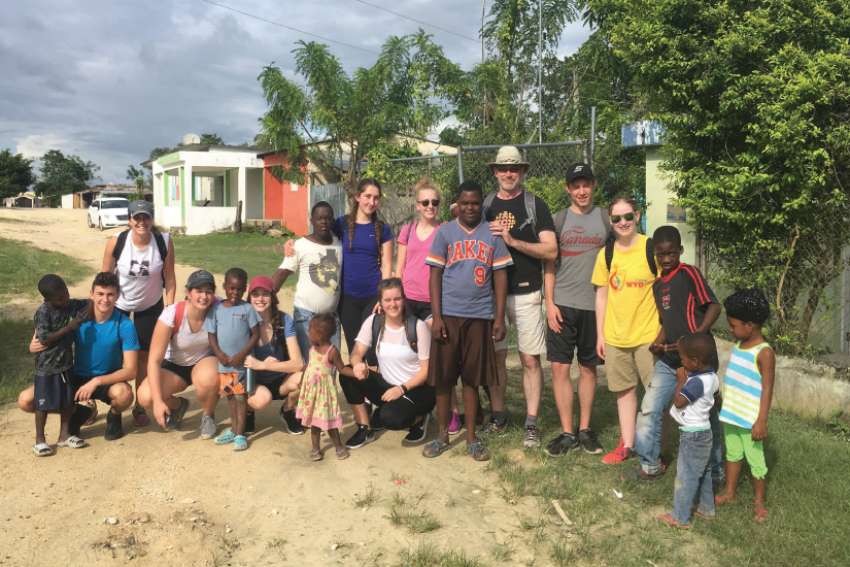What we witnessed on the batay among the mostly Haitian families living there was a potent mixture of subsistence living, resilience and hope: homes cobbled together with corrugated rusted metal, wooden poles and wire, a young woman who aspired to be a teacher caring for toddlers, a boy with Down Syndrome who took our hands and led us with delight to his home for a visit. Alongside the conspicuous poverty was simple hospitality, warm smiles of welcome.
On the batay the most solid homes are charitable gifts from Christian religious organizations. Another gift is the deep well that allows the community some distance from dysentery and typhoid. Hydro wires that run alongside the impossibly pocked and deep-rutted road to the batay flow with electricity on two six-hour cycles per day. Half of each day is candles, oil lamps and, if a family has the pesos for it, propane for cooking — if not, wood charcoal.
In the cultural lexicon of affluent North America, we have convinced ourselves that happiness flows from the accumulation of things: creature comforts, smart phones, lattes and luxury cars. Smooth asphalt roads, drinking water flowing from every tap and hydro on demand are everyday expectations. And despite these norms, we find things about which to complain.
On the batay we found joy without plenty, dignity and grace in people who hope for a brighter future despite a scarcity of opportunity, an abundance of back-breaking labour and shockingly low wages. Izabella, one of our students, summarized it this way: “It’s like here they count their blessings and at home we just seem to count our problems.”
Our group received her comment in silence, taking the time to chew on its implications. Perhaps the quality of our relationships, our capacity to care for each other, the inclination towards kindness, these things all together become the nesting place of joy.
None of our group had ever visited a batay before. None of our students expected to witness happiness in a physical setting as depressed and forlorn. Certainly Pope Francis has been clear on this point with his insistence on a Church of the poor, for the poor: a Church that encounters the person of Jesus and finds healing and wholeness there.
This was made most evident when we attended Mass at the Capilla (chapel) San Jose at Batay Las Pajas. A Grey Sister who served there, who had little English but a big desire to include us in the celebration, asked our students to lead the opening hymn.
We were without hymnals, but the students spontaneously launched into a vibrant, energized “Children of the Light” accompanied on percussion by the Grey Sister who pounded gleefully on a homespun tambourine, a large tin filled with pebbles.
After the Gospel was proclaimed, Father invited Graciela, the only student in our group with fluency in Spanish, to stand beside him and translate the homily. We were told to go out and witness what we had seen and heard amongst the poor. Father quoted St. Teresa of Avila: “Christ has no body now but yours … yours are the eyes through which He looks compassion on this world.”
For the Lord’s Prayer, the locals and visitors crossed aisles to join hands and pray together. The sign of peace took some time as the Grey Sister embraced everyone.
At our de-brief session, students expressed their delight, their deep sense of peace and belonging at a celebration of the Eucharist in a modest chapel amongst the poor of Batay Las Pajas. A persistent question emerged: “Why are our celebrations of the Eucharist at home not joyful like this?”
In our Catholic schools, we do well to provide students with opportunities to be led out of the comfort of home and to be led into an encounter with the other. These encounters confirm for them that they are children of light, shining with hope for this world and joy throughout the land.
(Olson is Superintendent of Learning at the Waterloo Catholic District School Board in Kitchener, Ont.)
Catholic schools lead students to embrace lessons far from home
By Richard OlsonTwenty-four Catholic high school students and five adult supervisors gathered in Consuelo, Dominican Republic, to debrief our day. We had toured a batay (sugar workers’ village) outside the city along a road that by Canadian standards would be considered impassible.
Please support The Catholic Register
Unlike many media companies, The Catholic Register has never charged readers for access to the news and information on our website. We want to keep our award-winning journalism as widely available as possible. But we need your help.
For more than 125 years, The Register has been a trusted source of faith-based journalism. By making even a small donation you help ensure our future as an important voice in the Catholic Church. If you support the mission of Catholic journalism, please donate today. Thank you.
DONATE

